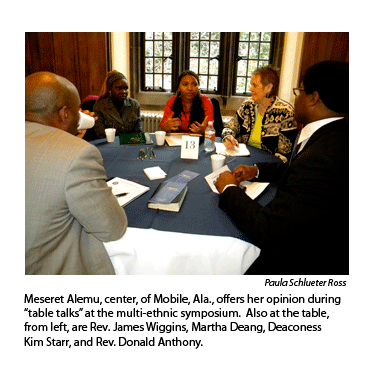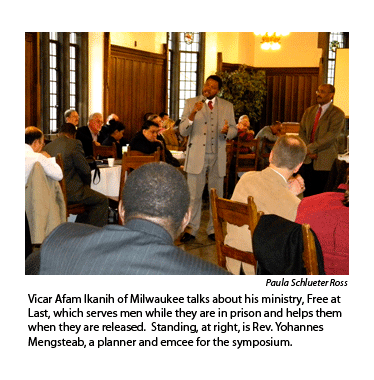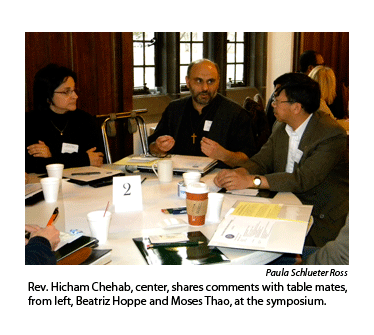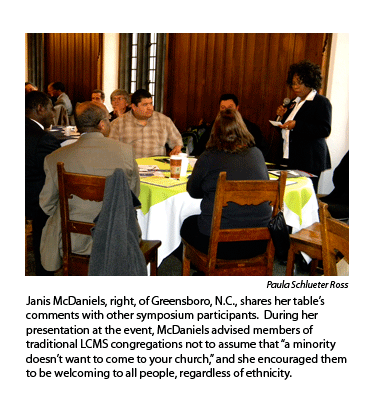By Paula Schlueter Ross
It was a telling moment when Rev. Eloy Gonzalez posed a question to more than 100 mostly non-white participants at the recent multi-ethnic symposium: “How many are delegates to the next [LCMS] convention?”
Only one person, a Black woman, stood.
“That’s the problem,” responded Gonzalez, senior pastor of Our Redeemer Lutheran Church in Irving, Texas.
“The issue” he was trying to illustrate, Gonzalez said later, “is that people who serve in ethnic minority ministries have very few venues … to share their voice with the broader church.”
How to share multi-ethnic perspectives with the church at-large — and how to encourage the Synod’s 95 percent white congregations to embrace people of various ethnicities for their gifts and abilities — were among topics discussed at the symposium, Feb. 1-2 at Concordia Seminary, St. Louis. The event was co-sponsored by the Synod’s Board for Black Ministry Services, the Black Clergy Caucus, National Mission Affiliates, the Center for Hispanic Studies, and National Mission Executives, with funding from LCMS World Relief and Human Care.
Dr. Yohannes Mengsteab, director of new mission development with LCMS World Mission and a planner and emcee for the symposium, said the event met its goals in that “people came to engage in a conversation of ‘hope,’ and indeed, their conversations were hope-filled conversations for a future LCMS that reflects the face of America and looks a little more like heaven.”
The symposium’s theme was “Conversations of Hope.”
Mengsteab, an immigrant from Eritrea, in eastern Africa, said the event’s participants “stated clearly” the “unity that we have in our commitment to the Scriptures and our Lutheran Confessions,” a “hopeful indication that the ethnic groups will enhance and strengthen our beloved Synod’s commitment to the Word of God.”
Participants also adopted a statement that challenges the Synod to recognize, respect, and celebrate the diversity of people.
“Differences are not the problem, they are just that — differences, and they should be celebrated,” the statement reads. “The problem is sin and that has expressed itself historically in our church so that non-Anglo-Saxon minorities are marginalized and seemingly voiceless in our structures.”
Through the statement, symposium participants say they are calling on the church “to move forward, not only in developing practical theological applications to our aspirations, but also through real dialogue leading to healthier relationships, growth, and discipleship as members of the church at-large.”
To read the entire statement, click here.
Keynote speaker Dr. John Nunes, president and CEO of Lutheran World Relief (LWR), Baltimore, cut short his stay in St. Louis because of LWR’s ongoing response to the earthquake in Haiti. Nunes said recovery in Haiti will take “three to five years at least,” and thanked symposium participants for their prayers.
He said it is LWR’s aim “to make a lasting and sustainable difference” in the developing nation.
In his talk, “On Earth as It Is in Heaven,” Nunes cited the advice of Dr. Howard Thurman to a frustrated Dr. Martin Luther King: “protect your spirit.” Nunes read Thurman’s poem, “The Work of Christmas,” and said that work — t o find the lost, heal the broken, feed the hungry, release the prisoner, teach the nations, bring Christ to all — is “to put faith into action.”
o find the lost, heal the broken, feed the hungry, release the prisoner, teach the nations, bring Christ to all — is “to put faith into action.”
Even though “race doesn’t exist” as a biological category, Nunes said, people often make it “the defining category of who and what we are,” creating stumbling blocks to mission efforts.
He recalled filling out a questionnaire in college, where as a biracial student born in Jamaica and raised in Canada he was reprimanded for checking boxes for “Black,” “Caucasian,” and “International Student.” Told by an administrator that he must “be one thing,” Nunes chose “Black” and ultimately led a Black-support group on a predominantly white campus.
Now, 30 years later, his teenage son is “running into some of the same [ethnic issues] that I ran into,” Nunes told the symposium. Nunes said he and his wife “haven’t prepared him for that kind of world,” and his son recently asked him, “Is it a curse to be Black? It feels like a curse to me.”
Prejudice damages the “witness of our faith,” Nunes said, and he urged symposium participants to move from a “hermeneutic of suspicion” to a “hermeneutic of understanding” between cultures by trying to understand the other person’s view.
Reaching out to others of different cultures, Nunes said, “is a risk worth taking … a beautiful risk.” He urged the group to “do the work of Christmas” and “bring Christ to all.”
Speakers representing various ethnic groups briefly addressed topics in unity, diversity, and problem-solving. In “table talks,” participants shared with one another — and the group at-large — why they are LCMS Lutherans, what gifts ethnic groups bring to the church, what ethnic concerns keep them apart, problems they have experienced in congregations, and ways to solve them.
Many said they chose the LCMS for its Bible-based theology, and believe ethnic groups have much to offer, including a zeal for outreach and more outreach opportunities, an increased understanding of the concerns of immigrants, different music and worship styles, and a focus on family values.
On the flip side, some said there were times they did not feel welcome in traditional LCMS congregations. There are often language and economic barriers, they said, and cultural differences in worship and leadership styles. It was noted that many minority ministries lack adequate funding and resource materials in their home languages.
In her presentation on “fixing the problems,” Janis McDaniels acknowledged that ethnic ministries can be “a very complex area to deal with.”
McDaniels, who is Black, said, “Don’t make the assumption that a minority doesn’t want to come to your church,” and she encouraged all LCMS congregations to be welcoming to all people.
She recalled a white pastor saying, “I really don’t know how to welcome Black people to my church,” and she offered a suggestion: ” ‘Good morning, welcome to [name of church],’ would work.”
“We have to do something about making people feel like they fit in,” McDaniels said.
And, while there is no magic, one-solution-fits-all, answer to problems related to ethnic diversity, she said, “what we can do is love each other.”
Dr. Frazier Odom, interim executive director of the LCMS Board for Black Ministry Services, told the symposium that 33 years ago he had considered the 1977 LCMS convention in Dallas, Texas, a high  point for Black ministry in the Synod because, since it coincided with a centennial celebration of Black ministry, it involved Black pastors and addressed Black concerns.
point for Black ministry in the Synod because, since it coincided with a centennial celebration of Black ministry, it involved Black pastors and addressed Black concerns.
“We thought things were going up,” Odom said, but “it did not follow through.” He encouraged symposium participants to “follow through” on their ideas for ethnic ministries.
Odom said he is an LCMS Lutheran because “I have not found any doctrine as pure.”
He believes, he added, that “in The Lutheran Church–Missouri Synod we got it right on paper, but we just got to get it off the paper and onto the streets.”
“Listening” to members of other ethnic groups, several participants said, is key to breaking down barriers. Others expressed frustration that the voices of minorities are not heard by the church at-large, and suggested that ethnic groups work together to bring their concerns to national church leaders and to get representatives of minority ministries elected to national offices.
Other ideas included proposing that minority congregations work together to supply ministry leaders and funding, starting a strategic planning group, creating “districts” for minority ministries, and encouraging congregations to sponsor more minority-inclusive events. For example, church choirs might include members of different ethnic groups and church dinners might offer foods from around the world.
One participant said, “Everything we do ought to be multi-ethnic.”
In his presentation on “Institutionally, what is the next step?,” Dr. Robert Scudieri, former associate executive director of LCMS World Mission, recalled the reaction of his wife’s parents when they met him — an Italian New Yorker: “Well, he’s a nice boy, but he’ll never go far in the German Missouri Synod.”
Scudieri presented ideas for making the Synod “look more like heaven.” He called for prayer, and said God is bringing new ethnic groups to the United States “as gifts to the LCMS.” Our “ingratitude” may be one reason immigrants aren’t joining Synod congregations, he said.
Scudieri called for more education, to develop “a more diverse [LCMS] leadership,” and encouraged the Synod to strengthen its Ethnic Immigrant Institute of Theology and Center for Hispanic Studies.
He urged symposium participants to become more involved in their circuits and districts, working to get minorities elected to LCMS positions. And he asked current Synod leaders to “open doors for more ethnic leaders.”
Scudieri said “the Synod needs new ethnic groups more than new ethnic groups need the Synod,” and suggested a “congress of ethnic leaders” be authorized to meet regularly, possibly in conjunction with the Synod’s national convention, and pass on their ideas to the Council of Presidents (COP) and other LCMS leaders. And, since “the COP is 100 percent white,” he asked, “why not invite the president of the Black Clergy Caucus and the president of the Hispanic Convention to meet with the COP on a regular basis? Maybe even to become a part of the COP.”
In his talk on “Where do we go and how do we get there?,” Dr. Assefa Zelelew, pastor of Mehanialem Ethiopian Lutheran Church in San Diego, noted that the face of the United States is becoming more ethnically diverse. So the church, he said, needs a vision for its future ministry.
Instead of “reacting to what is emerging,” as it is doing now, the church needs to understand the needs and challenges of ministering to ethnic groups, and it needs to make a plan for that ministry, he said.
Zelelew encouraged church workers to be “creative” in forming new worshiping communities; do demographic studies so they can understand what is happening around their congregations; empower minority leaders, who are most knowledgeable about their own ethnic groups; and “sit down together” with members of all ethnic groups to plan ministry goals and strategies.
LCMS First Vice President Dr. William Diekelman brought greetings from Synod President Dr. Gerald B. Kieschnick, who could not be at the symposium because he was attending the funeral of his father-in-law in Texas.
Diekelman promised to share participants’ concerns with Kieschnick and encouraged them to continue to share their ideas with the Synod. He also suggested that they identify minority leaders, and work to get them elected to national LCMS positions.
Kieschnick and encouraged them to continue to share their ideas with the Synod. He also suggested that they identify minority leaders, and work to get them elected to national LCMS positions.
“This is the church now talking because you are the church,” he said.
Dr. John Loum, director of the Ethnic Immigrant Institute of Theology and a symposium planner, told Reporter that he believes “progress will be made. Especially hearing from Dr. Scudieri and the first vice president — they have endorsed most, if not all, the ideas presented, so I think there’s a very strong sense that we will move forward.”
Mengsteab said he hopes the “healthy conversation” of the symposium continues, “so that we may learn from one another and grow stronger as a unified community of faith.”
The general consensus from symposium conversations “was that this was a very good start that needs to be continued,” echoed Kaye Wolff, chairman of the symposium planning committee.
Wolff said the event was open to all, and that all 35 LCMS district presidents were invited to attend, but none accepted.
Nevertheless, participants “came together as many different ethnic groups within the LCMS,” she said. “We healed some self-inflicted wounds of sins through confession and forgiveness. By the grace of God, we left as one group — one voice with a joint statement of hope to speak to the larger Synod body.”
Rev. Yia Vang, pastor of Hmong Hope Lutheran Church in Milwaukee, described the symposium as “great.”
He said he is “excited that the Synod is talking about bringing unity and working together and reaching out to all the ethnic groups.”
Vang said he found the event “very encouraging, and I think better things will come as a result of this for our Synod, and for ethnic ministry.”
Posted Feb. 18, 2010



